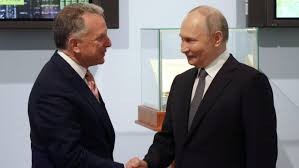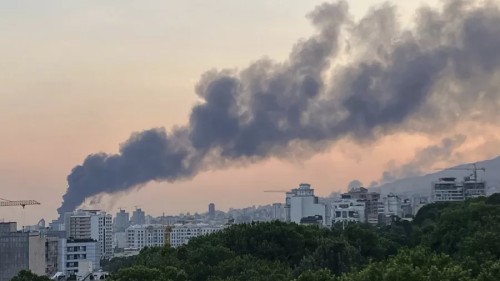Aug. 5—President Donald Trump has announced that his Special Envoy Steve Witkoff will arrive in Moscow possibly as soon as tomorrow, at the request of the Russian leadership, for meetings which will likely include one or more with Russian President Vladimir Putin. The visit and the meetings come in advance of Trump's announced Aug. 8 deadline for progress on a ceasefire in Ukraine, that would avoid the imposition of a new regime of sanctions on Russia, which Trump himself has speculated are unlikely to halt Russia's advance against NATO's proxy, Ukraine, on the battlefield.
Ceasefire Proposal Sparks Alarm in Kyiv
Sources close to the White House report that Witkoff is prepared to hammer out the outlines of a ceasefire proposal that might be acceptable to the Kremlin and Putin, but which will send NATO's Ukrainian dictator Volodymyr Zelenskyy into a rug-chewing fit. The basic concept, these sources say, is for a ceasefire in place—a halt in the fighting where existing battlelines are. In addition, Russia and Ukraine would agree to not fortify or resupply their positions during the ceasefire that would allow for real peace talks to take place, likely in Istanbul. But most important, the United States would agree to force Ukraine to discuss the adjustment in its borders, reflecting the fact that four eastern oblasts and the Crimea have become part of the Russian Federation. Zelenskyy has said that he would never cede even one inch of Ukraine's territory to the Russian "invaders," a position that Trump has called insane.
Zelenskyy, these sources say, is hysterical with fear that the U.S. will sell out his position to get a ceasefire. He reportedly has been frantically calling the White House, who have found reasons for Trump to not be available to take his call. The pint-sized dictator has also been calling his NATO allies in Germany, Great Britain, and France to urge them to back his position on territory concessions and to ask what Trump is really doing. They have been forced to admit to him that they have no idea what Trump and Witkoff are up to because no one has briefed them. “We expect something to happen,” they have told him, “but we have no idea what.”
Backchannel Diplomacy and Leadership Shifts
The White House sources say despite the recent bellicose threats towards Russia from Trump, Witkoff and his minions have been in touch with their backchannels in Moscow and have been working on getting things moving for a new round of talks. This has included working on getting Putin to agree to meet with Zelenskyy to discuss the terms of a peace agreement. Putin and his spokesmen now say such a meeting is possible, if preparations are made in advance by "experts" on both sides; that is key and code for progress in the negotiations and an agreement on a ceasefire.
The White House sources say that they are aware that the Ukrainian dictator is likely on the way out. Trump, they say, is making his push now for a ceasefire/peace deal because he believes that within weeks or sooner the Ukrainian military position will become untenable, and its lines are likely to collapse. Key elements of the Ukrainian military leadership share this assessment and want a negotiated end to the war to take place immediately. If Zelenskyy cannot consummate such a deal, then he will be replaced.
Trump-Putin Meeting Floated Amid Nuclear Tensions
"So, there are many moving parts here," said a source. "Trump's methods are chaotic, often contradictory, and even dangerous. But he and Witkoff may pull a rabbit out of the hat." This and other sources confirm one thing that would be discussed is a possible meeting, soon, between Putin and Trump, to de-escalate and put relations between the two superpowers back on a better track.
Kremlin spokesman Dmitry Peskov made very measured remarks overall about this Aug. 4, and in answer to questions about threats. Asked about Trump’s July 31 announcement that he had ordered two nuclear submarines into “appropriate regions” regarding Russia, Peskov noted that submarines are deployed all the time, “This is an ongoing process.” When asked about Trump objecting to remarks made by former Russian President Dmitry Medvedev last week, Peskov pointed out that the West—for example in Europe—has many who make tough statements; and as for policy, it is made by the President of Russia Vladimir Putin. He said that Russia “does not wish to become involved” in an exchange over nuclear threats.
June 18—Twenty-one Islamic countries have signed a statement condemning Israel’s attack on Iran. In a joint statement issued June 16, the Foreign Ministries rejected what they described as violations of international law and Israeli actions that threaten regional security, reported the Egyptian daily Al Ahram. The statement calls for the respect of sovereignty, territorial integrity, and for the peaceful resolution of disputes. It warned that the Israel-Iran conflict risked spiraling further and called for an immediate ceasefire and return to calm. It also voiced concern over the broader regional fallout of the escalation.
The statement also called for renewed negotiations over Iran’s nuclear program, describing diplomacy as the only viable path to a lasting agreement. The statement concluded that dialogue and adherence to international law—not military action—were essential to resolving the crisis. Iran had issued an urgent appeal to halt the war, and restart negotiations with the United States, that President Donald Trump has yet to formally respond to. Despite Trump's threatening bluster and hinting that the U.S. might join the war, sources close to the White House report that his emissaries are exploring restarting negotiations.
Signatories include Egypt, Algeria, Bahrain, Brunei, Chad, Comoros, Djibouti, Iraq, Gambia, Jordan, Kuwait, Libya, Mauritania, Pakistan, Qatar, Saudi Arabia, Somalia, Sudan, Türkiye, Oman, and the United Arab Emirates.
According to Iran’s Mehr News, the statement was initiated by Egypt, following consultations between Egyptian Foreign Minister Badr Abdelatty and his counterparts in the other 20 countries.
Russian Foreign Minister Sergey Lavrov highlighted the statement when he spoke with Egyptian Foreign Minister Badr Abdelatty today, the Russian Foreign Ministry reported. “The unprecedented escalation in the Middle East” was the main topic of discussion, with both ministers expressing their “profound concern regarding Israel’s use of force against Iran, which constitutes a violation of the UN Charter and international law.” Abdelatty “highly commended Russia’s readiness to offer the necessary mediation for a political and diplomatic resolution to the crisis,” it added.





